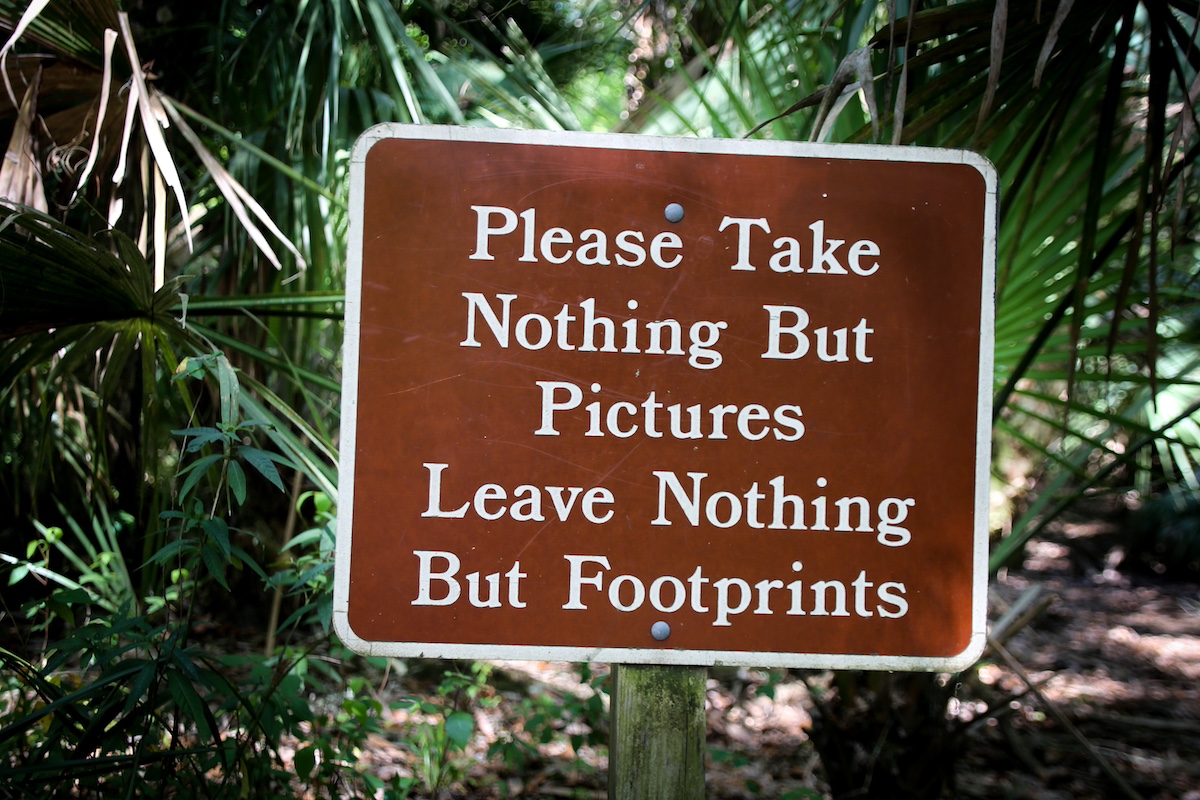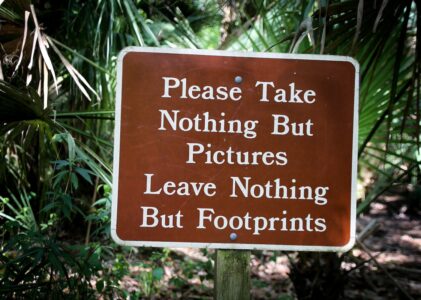Introduction
In recent years, campervan road trips have gained immense popularity among adventure seekers and nature enthusiasts. The allure of hitting the open road, with the freedom to explore new landscapes at your own pace, is irresistible. However, as the number of campervans on the road continues to rise, so does the need for responsible and sustainable travel practices. This is where the Leave No Trace (LNT) principles come into play.
Leave No Trace is not just a catchy phrase; it’s a set of ethical guidelines that help us minimize our impact on the environment while enjoying the great outdoors. In this extensive article, we will delve deep into what Leave No Trace means and how it applies specifically to campervan road trips. Join us on a journey to discover how to be a responsible and eco-conscious road tripper.
What Does Leave No Trace Mean?
Leave No Trace, often abbreviated as LNT, is a philosophy that promotes responsible outdoor ethics. It was developed in the 1960s by the Leave No Trace Center for Outdoor Ethics, a non-profit organization dedicated to educating people on how to enjoy nature while minimizing their impact on it. The LNT principles are a framework for making thoughtful decisions while in nature, ensuring that we leave our surroundings as pristine as we found them.
The Seven Leave No Trace Principles
- Plan Ahead and PrepareBefore embarking on your campervan road trip, meticulous planning is crucial. This includes researching your destination, understanding the local regulations, and preparing adequately for your journey. Proper planning ensures you have the right gear and knowledge to minimize your environmental impact.
- Travel and Camp on Durable SurfacesCampervans provide the luxury of mobility, but they can also leave a lasting mark on fragile ecosystems if not used responsibly. Stick to established campsites and avoid driving off-road, as this can damage vegetation and disturb wildlife.
- Dispose of Waste ProperlyResponsible waste disposal is paramount. Pack out all trash and litter, and use designated dump stations for your camper’s sewage. Avoid disposing of waste in natural water sources, which can harm aquatic life and pollute the environment.
- Leave What You FindThe principle of leaving no trace extends to the natural environment as well. Do not pick plants, disturb wildlife, or remove rocks or artifacts. Preserve the beauty and integrity of the landscapes you encounter.
- Minimize Campfire ImpactCampfires can be enjoyable, but they can also scar the land and deplete resources. Use a camp stove for cooking and minimize campfire usage. If fires are permitted, use established fire rings or fire pans.
- Respect WildlifeObserving wildlife is one of the joys of camping, but it’s essential to maintain a respectful distance and not disturb their natural behaviors. Keep food stored securely to prevent attracting animals to your campsite.
- Be Considerate of Other VisitorsSharing the outdoors with others means being mindful of their experience. Keep noise levels down, yield the trail to hikers, and respect the privacy and solitude of fellow travelers.
How Leave No Trace Applies to Campervan Road Trips
Now that we have a comprehensive understanding of the Leave No Trace principles, let’s explore how these guidelines specifically apply to campervan road trips. Campervans, also known as RVs or motorhomes, offer a unique way to travel, blending the comforts of home with the allure of the great outdoors. However, they also present distinct challenges when it comes to responsible outdoor ethics.
1. Planning Your Campervan Adventure
Research Campsite Regulations
Before you hit the road, research the regulations and guidelines specific to the areas you plan to visit. Different regions may have varying rules about where you can camp, how long you can stay, and what activities are allowed. This knowledge will help you plan your route and ensure you’re always in compliance with local regulations.
Pack Thoughtfully
In a campervan, it’s easy to overpack, but it’s essential to bring only what you need. Consider the limited space and weight capacity of your vehicle. Opt for reusable and eco-friendly camping gear, and be mindful of the products you bring, such as biodegradable soaps and cleaning supplies.
2. Traveling and Camping Responsibly
Stick to Designated Campgrounds
While campervans offer the flexibility to camp almost anywhere, it’s crucial to stay in established campgrounds whenever possible. These areas are equipped with proper amenities, including waste disposal facilities, fire rings, and picnic tables. By using designated campsites, you minimize your impact on the surrounding environment.
Follow Leave No Trace Guidelines for Campfires
Campfires can be a cozy addition to your campervan adventure, but they must be managed responsibly. If fires are allowed at your campsite, use established fire rings or pans. Keep the fire small and use dead, fallen wood instead of cutting live vegetation. When you’re done, ensure the fire is completely extinguished.
3. Waste Disposal and Hygiene
Dispose of Waste Properly
One of the significant challenges of campervan travel is waste disposal. Always pack out your trash and litter, and never leave waste behind at your campsite. When it comes to sewage disposal, use designated dump stations. Dumping waste in nature is not only illegal but harmful to the environment.
Use Eco-Friendly Toiletries
Choose eco-friendly toiletries and cleaning products to minimize your impact on the environment. Biodegradable soaps and detergents are readily available and help ensure that the water you use in campervan sinks and showers doesn’t harm aquatic ecosystems.
4. Preserving Natural Beauty
Stay on Established Roads
Campervans are equipped for off-road adventures, but it’s essential to stay on established roads and trails to avoid damaging fragile ecosystems. Off-roading can lead to soil erosion, destruction of vegetation, and habitat disruption for wildlife.
Leave Natural Features Untouched
Resist the urge to pick plants, remove rocks, or alter natural features during your campervan road trip. Leaving these elements untouched preserves the integrity of the landscape and ensures it remains a beautiful destination for future travelers.
5. Interacting with Wildlife
Observe from a Distance
Wildlife encounters are often a highlight of any camping trip. When observing animals, use binoculars or a zoom lens to maintain a safe and respectful distance. Do not approach or feed wildlife, as this can disrupt their natural behaviors and harm both them and you.
Secure Food and Trash
To avoid attracting wildlife to your campsite, store food securely in bear-resistant containers or lockable cabinets in your campervan. This not only protects you but also the animals, as human food can be harmful to their health.
6. Being Considerate of Fellow Travelers
Respect Quiet Hours
Many campgrounds have designated quiet hours to ensure a peaceful experience for all visitors. Be mindful of these hours and keep noise levels down, especially if you have late-night activities planned.
Yield to Hikers and Bikers
If you’re sharing the trail with hikers or bikers, yield the right of way to them. Slow down and give them plenty of space, ensuring their outdoor experience is as enjoyable as yours.
Practical Tips for Applying Leave No Trace to Your Campervan Road Trip
To further enhance your understanding of Leave No Trace principles and their application to campervan road trips, let’s explore some practical tips:
1. Minimize Water Usage
Water is a precious resource, especially in arid regions. Be mindful of your water consumption by taking shorter showers, turning off the tap while brushing your teeth, and collecting rainwater for non-potable uses.
2. Embrace Solar Power
Invest in solar panels for your campervan to reduce your reliance on fossil fuels. Solar power can charge your devices, power your lights, and even run small appliances, all while reducing your carbon footprint.
3. Leave No Trace of Your Campsite
When it’s time to move on from a campsite, thoroughly clean up the area. Check for any trash, unburned materials in fire rings, or signs of your presence, and leave the site as if you were never there.
4. Participate in Clean-up Initiatives
Join local clean-up efforts and volunteer organizations that focus on maintaining the beauty of natural areas. This allows you to give back to the environment and contribute positively to the places you visit.
5. Educate Yourself and Others
Continuously educate yourself about Leave No Trace principles and share your knowledge with fellow campers and travelers. The more people who adopt these practices, the better we can protect our natural treasures.
Leave No Trace
Embarking on a campervan road trip is a thrilling adventure, offering the chance to explore breathtaking landscapes and create unforgettable memories. However, it’s our responsibility as travelers to ensure that these landscapes remain pristine for generations to come. By following the Leave No Trace principles and applying them diligently to your campervan journey, you can enjoy the beauty of nature while leaving minimal impact behind. So, pack your bags, hit the road, and be a steward of the environment during your next campervan adventure.
- Leave No Trace Center for Outdoor Ethics: The official website of the Leave No Trace organization, offering comprehensive information, resources, and educational materials on outdoor ethics.
- National Park Service – Leave No Trace: The National Park Service provides valuable insights and guidelines on Leave No Trace principles, especially when visiting national parks in the United States.
- REI Co-op – Leave No Trace: REI, a well-known outdoor retail company, offers a helpful Leave No Trace resource page with articles, videos, and tips for outdoor enthusiasts.
- The Wilderness Society – Leave No Trace: The Wilderness Society provides information on Leave No Trace ethics and how to protect wild places while enjoying them.
- Backpacker Magazine – Leave No Trace: Backpacker Magazine offers articles and tips on Leave No Trace principles for backpackers and campers.

